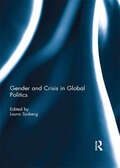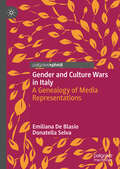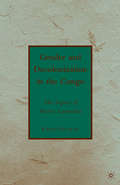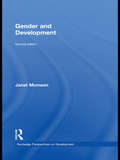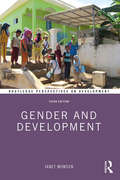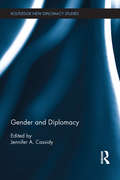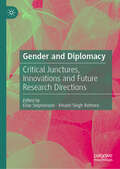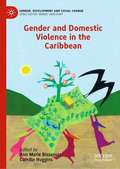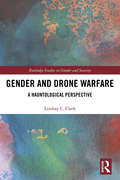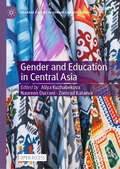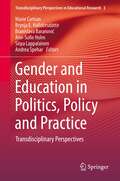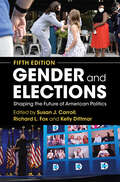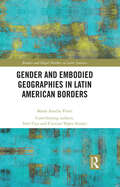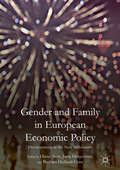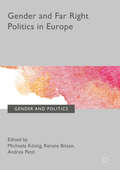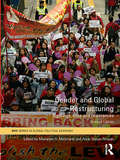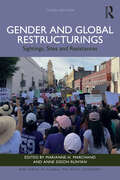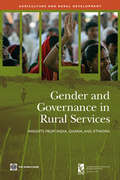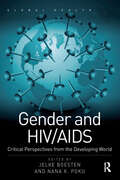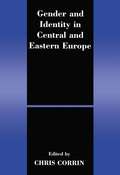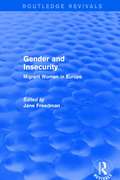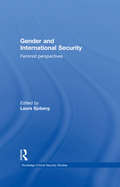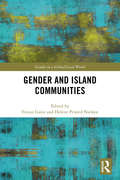- Table View
- List View
Gender and Crisis in Global Politics
by Laura SjobergThe global political arena is (again) in a time of crisis. Different sources pay attention to different crises: the Global Financial Crisis, the Debt Crisis, the Crisis of ISIL/Daesh in Iraq and Syria, the Crisis of Israel and Palestine, and the Iran Nuclear Crisis have gotten significant attention in media coverage of global politics. But those are not the only crises that scholars and practitioners discuss. Environmentalists warn of ecological crisis, health scholars warn of disease crises, cyber-security experts suggest a coming information crisis, and migration experts warn of population crises. Feminist work on global politics has addressed many of these crises - historical and contemporary - in crisis language and without it, as well as a number of the non-crises that looking for women and gender in the international arena draws into focus. That work, however, had generally not explicitly theorized the conceptualization of crisis, its gendered dimensions, and/or gender-based crises as such. Across this book, feminist conversations about crisis in global politics suggests that a single feminist approach to, definition of, or politics of crisis is impossible to find. That same variety of work, though, makes a strong case that paying attention to crises in the world and to the manufacture of crisis rhetoric alongside events in global politics is not only generally important but an important place for feminist scholarship, feminist political activism, and direct attention. This book was previously published as a special issue of the International Feminist Journal of Politics.
Gender and Culture Wars in Italy: A Genealogy of Media Representations
by Donatella Selva Emiliana De BlasioThis book examines contemporary culture wars around gender in Italy. Applying methods from European cultural studies, the authors reconstruct the ways in which gender issues have become part of the contemporary culture wars in Italy. Recently the convergence between neoliberalism and populism has emphasised the centrality of gender in the political arena at the global level, as well as its crucial place in the rise of far-right and alt-right formations. By examining the cases of three key debates from the last five years, this book traces the moments, actors, and argumentative strategies that triggered these culture wars around gender issues.
Gender and Decolonization in the Congo
by Karen BouwerGender and Decolonization in the Congo focuses on women and questions of gender in its examination of Patrice Lumumba (1925-1961), the assassinated leader of the independent Congo.
Gender and Development (Routledge Perspectives on Development)
by Janet MomsenGlobal financial problems, rising food prices, climate change, international migration - increasingly by women - conflict situations in many poor countries, the spread of tropical diseases such as malaria and dengue fever and the increased incidence of HIV/AIDS and TB, and changing patterns of trade have all added new dimensions to gender issues in developing countries. These problems are frequently being brought to public attention in the media and through long-haul tourism. Consequently students' interest in gender and development has grown considerably in the last few years. This updated second edition provides a concise, accessible introduction to Gender and Development issues in the developing world and in the transition countries of Eastern and Central Europe. The nine chapters include discussions on changes in theoretical approaches, gender complexities and the Millennium Development Goals; social and biological reproduction including differing attitudes to family planning by states and variation in education and access to housing; differences in health and violence at major life stages for women and men and natural disasters and gender roles in rural and urban areas. The penultimate chapter considers the impact of broad economic changes such as the globalization of trade and communications on gender differences in economic activity and the final chapter addresses international progress towards gender equality as measured by the global gender gap. The text is particularly strong on environmental aspects and the new edition builds on this to consider the effects of climate change and declining natural resources illustrated by a case study of changing gender roles in fishing in India. There is also enhanced coverage of topics such as global trade, sport as a development tool, masculinities, and sustainable agriculture. Maps, statistics, references and boxed case studies have been updated throughout and their coverage widened. Gender and Development is the only broad based introduction to the topic written specifically for a student audience. It features student friendly items such as chapter learning objectives, discussion questions, annotated guides to further reading and websites. The text is enlivened throughout with examples and case studies drawn from the author's worldwide field research and consultancies with international development agencies over four decades and her experience of teaching the topic to undergraduates and postgraduates in many countries. It will be an essential text for a variety of courses on development, women's studies, sociology, anthropology and geography.
Gender and Development (Routledge Perspectives on Development)
by Janet MomsenThis revised and updated third edition of Gender and Development provides a concise, accessible introduction to gender and development issues in the developing world and in the transition countries of Eastern and Central Europe. The nine chapters include discussions on: changes in theoretical approaches, gender complexities and the Sustainable Development Goals; social and biological reproduction including changing attitudes to family planning; variation in education and access to housing; differences in health and violence at major life stages for women and men; natural disasters, climate change and declining natural resources, and gender roles in rural and urban areas. There is also enhanced coverage of topics such as global trade, sport as a development tool, masculinities and sustainable agriculture. Maps, statistics, have been updated throughout and their coverage widened. New case studies have been added on Bangladesh, on violence in Peru and India, halal tourism and on garbage collection in the Maldives. The book features student-friendly items such as chapter learning objectives, discussion questions, annotated guides to further reading and websites. The text is enlivened throughout with examples and case studies drawn from the author’s worldwide field research and consultancies with international development agencies over four decades and her experience of teaching the topic to undergraduates and postgraduates in many countries. Gender and Development is the only broad-based introduction to the topic written specifically for a student audience. It will be an essential text for a variety of courses on development, women’s studies, sociology, anthropology and geography.
Gender and Diplomacy (Routledge New Diplomacy Studies)
by Jennifer A. CassidyThis volume provides a detailed discussion of the role of women in diplomacy and a global narrative of their current and historical role within it. The last century has seen the Ministries of Foreign Affairs (MFAs) experience seismic shifts in their policies concerning the entry, role and agency of women within their institutional make-up. Despite these changes, and the promise that true gender equality offers to the diplomatic craft, the role of women in the diplomatic sphere continues to remain overlooked, and placed on the fringes of diplomatic scholarship. This volume brings together established scholars and experienced diplomatic practitioners in an attempt to unveil the story of women in diplomacy, in a context which is historical, theoretical and empirical. In line with feminist critical thought, the objective of this volume is to theorize and empirically demonstrate the understanding of diplomacy as a gendered practice and study. The aims of are three-fold: 1) expose and confront the gender of diplomacy; 2) shed light on the historical involvement of women in diplomatic practice in spite of systemic barriers and restrictions, with a focus on critical junctures of diplomatic institutional formation and the diplomatic entitlements which were created for women at these junctures; 3) examine the current state of women in diplomacy and evaluate the rate of progress towards a gender-even playing field on the basis thereof. This book will be of much interest to students of diplomacy studies, gender studies, foreign policy and international relations.
Gender and Diplomacy: Critical Junctures, Innovations and Future Research Directions
by Elise Stephenson Khushi Singh RathoreThis edited collection aims to bring new contexts and research innovations to study the changing nature of gender in diplomacy. Whilst historically most diplomats were men, in the twenty-first century, the proportion of women (and others of diverse backgrounds) has increased markedly and in select cases, surpasses men. Digital diplomacy, glass cliffs, diplomatic gatekeeping, nation branding, queer and critical race studies and more have begun to be studied in the context of gender and diplomacy, raising new questions, in new contexts, and driving new innovations in diplomacy. How is diplomacy responding to these changes? How does gender, sexuality and race intersect to reproduce diplomatic relations? This edited collection unpacks the queering of diplomacy, the security/diplomacy nexus, gender and West/non-West distinctions in diplomacy, gender and foreign policy, and women in MFAs and foreign service.
Gender and Domestic Violence in the Caribbean (Gender, Development and Social Change)
by Ann Marie Bissessar Camille HugginsDomestic violence, interpersonal violence, intimate partner violence, or gender-based violence continues to be a social problem that is rarely understood or discussed in many parts of society, worldwide. The same holds true in the Anglophone Caribbean. Most Caribbean societies are patriarchal in nature, as most men govern and create the political and economic landscape where citizens live. This edited volume brings together reputable scholars of rigorous academic research from various disciplines (e.g., political science, law, linguistics, criminology, nursing, social work and psychology) to clearly explain the conceptual definition of domestic violence within the Latin American and Caribbean region’s socio-political context. It will highlight who are the perpetrators as well as the victims of domestic violence and the consequences of allowing domestic violence to perpetuate in the region. This book is unique in the market today, as it is the only book grounded in the Caribbean providing a comprehensive overview of domestic violence with regards to the significance, victims, perpetrators, and the consequences.
Gender and Drone Warfare: A Hauntological Perspective (Routledge Studies in Gender and Security)
by Lindsay C. ClarkThis book investigates how drone warfare is deeply gendered and how this can be explored through the methodological framework of ‘Haunting’. Utilising original interview data from British Reaper drone crews, the book analyses the way killing by drones complicates traditional understandings of masculinity and femininity in warfare. As their role does not include physical risk, drone crews have been critiqued for failing to meet the masculine requirements necessary to be considered ‘warriors’ and have been derided for feminising war. However, this book argues that drone warfare, and the experiences of the crews, exceeds the traditional masculine/feminine binary and suggests a new approach to explore this issue. The framework of Haunting presented here draws on the insights of Jacques Derrida, Avery Gordon, and others to highlight four key themes – complex personhood, in/(hyper)visibility, disturbed temporality and power – as frames through which the intersection of gender and drone warfare can be examined. This book argues that Haunting provides a framework for both revealing and destabilising gendered binaries of use for feminist security studies and International Relations scholars, as well as shedding light on British drone warfare. This book will be of interest to students of gender studies, sociology, war studies, and critical security studies.
Gender and Education in Central Asia (Palgrave Studies in Gender and Education)
by Naureen Durrani Aliya Kuzhabekova Zumrad KataevaThis open access book brings together established and emerging scholars to explore policies, statistical trends and representative research on gender equity across post-Soviet Central Asia. The book provides an overview of policy development in the promotion of gender equity, a comparative summary of changes in gender equity indicators at various levels of education, and examples of current research on an array of issues relating to gender equity across the region. The chapters present a broad picture which will be relevant to scholars of educational reform, comparative education policy, international development and gender issues.
Gender and Education in Politics, Policy and Practice: Transdisciplinary Perspectives (Transdisciplinary Perspectives in Educational Research #3)
by Andrea Spehar Marie Carlson Brynja E. Halldórsdóttir Branislava Baranović Ann-Sofie Holm Sirpa LappalainenThis book presents ideas on education, gender and intersectionality through a transdisciplinary frame by crossing disciplinary and methodological borders. Exploring the diversity of educational settings ranging from early childhood to adult education, it brings together scholars from various disciplines to discuss, deconstruct and problematize gender and education in relation to several themes in a comparative, intersectional, local, national, regional and international perspective. Each chapter approaches the topic in an intersectional and/or transnational manner and creates powerful gendered educational knowledge. Questions addressed in the book include: What are the challenges or barriers to gender-equal education? How can we understand the gaps between formal policies and educational practices? The chapters in the book illustrate how gender and education are relevant and needed concepts within the field of transdisciplinary research. The authors hail from a range of countries, such as Croatia, Indonesia, Turkey, UK, as well as the Nordic region, and they critically examine gender and education at all levels and in diverse sectors, and with varied lenses, such as neoliberalism in education, and the inclusion of newcomers and refugees. The work also critically investigates programs and pedagogical approaches, culture and values, knowledge and identity in teacher education. The book further addresses criticisms of Western and Anglophone bias around “white feminism” and the norm of white, male and heterosexual privilege.
Gender and Elections
by Richard L. Fox Susan J. CarrollThe new edition of this book describes the role of gender in the American electoral process through the 2008 elections. It strikes a balance between highlighting the most important developments for women as voters and candidates in the 2008 elections and providing a deeper analysis of the ways that gender has helped shape electoral politics in the United States. Individual chapters demonstrate the importance of gender in understanding presidential elections, voter participation and turnout, voting choices, the participation of African American women, congressional elections, the support of political parties and women's organizations, candidate communications with voters, and state elections. This updated volume also includes new chapters that analyze the roles of Latinas in U. S. politics and chronicle the candidacies of Hillary Clinton and Sarah Palin.
Gender and Elections
by Richard L. Fox Susan J. CarrollThe third edition of Gender and Elections offers a systematic, lively, and multifaceted account of the role of gender in the electoral process through the 2012 elections. This timely yet enduring volume strikes a balance between highlighting the most important developments for women as voters and candidates in the 2012 elections and providing a more long-term, in-depth analysis of the ways that gender has helped shape the contours and outcomes of electoral politics in the United States. Individual chapters demonstrate the importance of gender in understanding and interpreting presidential elections, presidential and vice-presidential candidacies, voter participation and turnout, voting choices, congressional elections, the political involvement of Latinas, the participation of African American women, the support of political parties and women's organizations, candidate communications with voters, and state elections. Without question, Gender and Elections is the most comprehensive, reliable, and trustworthy resource on the role of gender in US electoral politics.
Gender and Elections: Shaping the Future of American Politics
by Richard L. Fox Susan J. Carroll Kelly DittmarThe fifth edition of Gender and Elections offers a lively, multi-faceted account of the role of gender in the electoral process through the 2020 elections. This timely yet enduring volume strikes a balance between highlighting the most important developments for women as voters and candidates in the 2020 elections and providing an in-depth analysis of the ways that gender has helped shape the contours and outcomes of electoral politics in the United States. Individual chapters demonstrate the importance of gender in understanding presidential, congressional, and state elections; voter participation, turnout, and choices; participation of African American women and Latinas; support of political parties and women's organizations; and candidate communication. New chapters explore the role of social movements in elections and introduce concepts of gendered and raced institutions, intersectionality, and identity politics applied to presidential elections from past to present. The resulting volume is the most comprehensive and reliable resource on the role of gender in electoral politics.
Gender and Embodied Geographies in Latin American Borders (Borders and Illegal Markets in Latin America)
by Maria Amelia Viteri Iréri Ceja Cristina Yépez ArroyoGender and Embodied Geographies in Latin American Borders is the first study of its kind to bring a gender perspective to studies on violence and "illegal markets" in the region. Analyzing the structural problems that create inequality and enable gendered violence in Mexico, Guatemala, Colombia, Ecuador, Peru, Bolivia, Brazil and Argentina, the authors offer a critique of the securitization of borders and the criminalization of human mobility, and propose alternatives to reduce violence. Newspaper reports on gender and the variables of violence, human trafficking, people smuggling, missing persons, victims and perpetrators uncover the production and reproduction of discourses and images related to violence. Interviews with strategic actors from nongovernmental organizations, academia, as well as public policy makers diversify the experiences from the different voices of authority. Gender and Embodied Geographies in Latin American Borders encourages us to continue to question silence, impunity, the restriction of mobility, the dehumanization of securitization policies and the institutionalization of gender violence. A welcomed must read for scholars, researchers, policy makers, and students of gender studies, security studies and migration.
Gender and Family in European Economic Policy: Developments in the New Millennium
by Diana Auth Jutta Hergenhan Barbara Holland-CunzThis collection explores how pioneering gender equality policies have shaped women's economic presence in Europe since 2000. Equal pay policies, parental leave reforms, corporate quotas and electoral quotas have raised pressing questions about the effectiveness in promoting equal participation, as researchers quote both quantitative improvement in gender diversity and qualitative lag in cultural change. The chapters in this book present interlocking cross-national and cross-policy comparisons of the three most controversial reforms: equal pay, parental leave, and quotas for political representatives. The contributors address the cultural context in which reforms arose, internally contradictory policies, and the relative effectiveness of fast-track quotas and incentives compared to long-term efforts to change the overall culture of gender. This critical examination of the new millennium's groundbreaking gender policies will appeal to academics and practitioners interested in the progress of gender equality in the economic, political, and social welfare fields.
Gender and Far Right Politics in Europe
by Michaela Köttig Renate Bitzan Andrea PetöThis book is a systematic consideration of the link between the extreme right and the discourse about developments in regard to gender issues within different national states. The contributors analyze right-wing extremist tendencies in Europe under the specific perspective on gender. The volume brings together the few existing findings concerning the quantitative dimension of activities carried out by men and women in different countries, and illuminates and juxtaposes gender ratios along with the role of women in right-wing extremism. Along with the gender-specific access to right-wing groups, the chapters look at networks, organizational forms, specific strategies of female right-wing extremists, their ideologies (especially regarding femininity and masculinity), hetero normativity, discourses on sexuality, and preventive and counter-strategies. The book will be of use to students and scholars interested in gender and politics, European politics, and political extremism.
Gender and Global Restructuring: Sightings, Sites and Resistances (RIPE Series in Global Political Economy)
by Anne Sisson Runyan Marianne H. MarchandIn this new edition of this best selling text, interdisciplinary feminist experts from around the world provide new analyses of the ongoing relationship between gender and neoliberal globalization under the new imperialism in the post-9/11 context. Divided into Sightings, Sites and Resistances, this book examines: the disciplining politics of race, sexuality and modernity under securitized globalization, including case studies on domestic workers in Hong Kong heteronormative development policies and responses to the crisis of social reproduction and colonizing responses to AIDS in sub-Saharan Africa migration, human rights and citizenship, including studies on remittances, the emergence of neoliberal subjectivities among rural Mexican women, Filipina migrant workers and women’s labor organizing in the Middle East and North Africa feminist resistance, incorporating the latest scholarship on transnational feminism and feminist critical globalization movement activism, including case studies on men’s violence on the Mexico/US border, pan-indigenous women’s movements and cyberfeminism. Providing a coherent and challenging approach to the issues of gender and the processes of globalization in the new millennium, this important text will be of interest to students and scholars of IPE, international relations, economics, development and gender studies.
Gender and Global Restructurings: Sightings, Sites and Resistances (RIPE Series in Global Political Economy)
by Marianne H. MarchandIn the new edition of this bestselling text and scholarly reference, new and revised chapters reflect shifts in the gendered, classed, racialized and sexualized nature of ongoing global restructurings.Through fresh intersectional feminist analyses of widening health, climate, care, inequality, democracy and knowledge crises since the Great Financial Crisis and the deepening of many forms of capitalism, this volume stresses the complexities of multiple restructurings which demand new ways to think across sightings, sites and resistances. Some of each of these elements are in every chapter, which take the reader to different sightings, such as of neoliberalizations, neoauthoritarianizations, multipolarizations, financializations and migrations. They also bring into view different geographic sites, such as Hong Kong, sub-Saharan and North Africa, Canada, Mexico, Bangladesh and the trade blocs of the European Union and the BRICs, and different nongeographic sites such as productive and reproductive economies and the virtual economy of finance and digitalization. They further highlight different forms of women’s and feminist resistance, such as local and national labor organizing, regional and multipolar organizing, reimagining infrastructure design and broadening noncapitalist community and solidarity economies. Many chapters critique problematic constructions of women’s empowerment, and all challenge the machinations of neoliberal capital that undermine most women, marginalized peoples and the planet.Providing a coherent and challenging approach to contemporary gendered globalization, better understood as global restructurings, since the last edition over a decade ago, Gender and Global Restructurings will be of interest to students and scholars of international political economy, international relations, economics, development and gender studies.
Gender and Governance in Rural Services
by The World Bank International Food Policy Research Insti'Gender and Governance in Rural Services' provides policy-relevant knowledge on strategies to improve agricultural and rural service delivery with a focus on providing more equitable access to these services, especially for women. It focuses India, Ethiopia, and Ghana, and focuses on two public services: agricultural extension, as an example of an agricultural service, and on drinking water, as an example of rural service that is not directly related to agriculture but is of high relevance for rural women. It provides empirical microlevel evidence on how different accountability mechanisms for agricultural advisory services and drinking water provision work in practice, and analyzes factors that influence the suitability of different governance reform strategies that aim at making service provision more gender responsive. It presents major findings from the quantitative and qualitative research conducted under the project in the three countries, which are analyzed in a qualitative way to identify major patterns of accountability routes in agricultural and rural service provision and to assess their gender dimension. The book is intended for use by a wide audience interested in agricultural and rural service provision, including researchers, members of the public administration, policy makers, and staff from nongovernmental organizations (NGOs) and international development agencies who are involved in the design and management of reform efforts, projects, and programs dealing with rural service provision.
Gender and HIV/AIDS: Critical Perspectives from the Developing World (Routledge Global Health Series)
by Nana K. PokuGender issues are central to the causes and impact of the ongoing AIDS epidemic. The editors bring together cutting edge contemporary scholarship on gender and AIDS in one volume. They address questions related to gender and sexuality, how women and men live the epidemic differently and how such differences lead to different outcomes. The volume joins research on Africa, Asia and Latin America and illustrates how the epidemic has different gendered characteristics, causes and consequences in different regions. Collectively, the chapters demonstrate the fundamental ways that gender influences the spread of the disease, its impact and the success of prevention efforts. This scholarly, interdisciplinary volume provides a comprehensive introduction to the themes and issues of gender, AIDS and global public health and informs students, policy makers and practitioners of the complexity of the gendered nature of AIDS.
Gender and Identity in Central and Eastern Europe
by Chris CorrinThis collection highlights changes in Central and Eastern Europe since 1989 from the perspectives of gender and identity. Resistance to the negative consequences of certain changes demonstrate that women's activities have played a large part in democratic developments in various countries.
Gender and Insecurity: Migrant Women in Europe (Critical Security Ser.)
by Jane FreedmanThis title was first published in 2003. Migration is a phenomenon which is at the heart of global politics and, within the EU, governments are continually trying to reinforce their controls of migration. These controls, designed to increase the security of European populations may, however, have the adverse effect of increasing the insecurity of migrants. This is particularly true for the many women who migrate to Europe and find themselves in insecure positions because of their lack of independent legal status, the difficulty of access to adequate health and social security provision and their particular vulnerability to both domestic and institutional forms of violence. They are often in economically weak positions, either unemployed or in badly paid part-time or domestic jobs with no forms of social protection. Gender and Insecurity addresses these various forms of insecurity and details ways in which they might be addressed. Further, it looks at the ways in which immigrant women have themselves tried to fight against these insecurities through their own political mobilisation.
Gender and International Security: Feminist Perspectives (Routledge Critical Security Studies #17)
by Laura SjobergThis book defines the relationship between gender and international security, analyzing and critiquing international security theory and practice from a gendered perspective. Gender issues have an important place in the international security landscape, but have been neglected both in the theory and practice of international security. The passage and implementation of UN Security Council Resolution 1325 (on Security Council operations), the integration of gender concerns into peacekeeping, the management of refugees, post-conflict disarmament and reintegration and protection for non-combatants in times of war shows the increasing importance of gender sensitivity for actors on all fronts in global security. This book aims to improve the quality and quantity of conversations between feminist security studies and security studies more generally, in order to demonstrate the importance of gender analysis to the study of international security, and to expand the feminist research program in Security Studies. The chapters included in this book not only challenge the assumed irrelevance of gender, they argue that gender is not a subsection of security studies to be compartmentalized or briefly considered as a side issue. Rather, the contributors argue that gender is conceptually, empirically, and normatively essential to studying international security. They do so by critiquing and reconstructing key concepts of and theories in international security, by looking for the increasingly complex roles women play as security actors, and by looking at various contemporary security issues through gendered lenses. Together, these chapters make the case that accurate, rigorous, and ethical scholarship of international security cannot be produced without taking account of women's presence in or the gendering of world politics. This book will be of interest to all students of critical security studies, gender studies and International Relations in general. Laura Sjoberg is Assistant Professor of Political Science at the University of Florida. She has a Phd in International Relations and Gender Studies from the University of Southern California and is the author of Gender, Justice, and the Wars in Iraq (2006) and, with Caron Gentry, Mothers, Monsters, Whores: Women's Violence in Global Politics (2007)
Gender and Island Communities (Gender in a Global/Local World)
by Helene Pristed Nielsen Firouz GainiThis book takes an explicitly feminist approach to studying gender and social inequalities in island settings while deliberating on ‘islandness’ as part of the intersectional analysis. Though there is a wealth of recent literature on islands and island studies, most of this literature focuses on islands as objects of study rather than as contexts for exploring gender relations and local gendered developments. Taking Karides’ ‘Island feminism’ as a starting point and drawing from the wider literature on island studies as well as gender and place, this book bridges this gap by exploring gender, gender relations, affect and politics in various island settings spanning a great variety of global locations, from the Faroe Islands and Greenland in the north to Tasmania in south. Insights on recent developments and gendered contestations in these locations provide rich food for thought on the intricate links between gender and place in a local/global world. This text will be of key interest to students and scholars of gender and feminist studies, cultural studies, Island studies, anthropology, and more broadly to sociology, geography, diversity and social justice studies, global democracy, and international relations.
